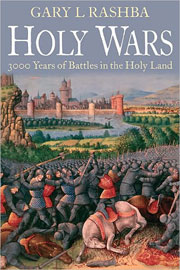From Jericho to Gaza — 3,000 years of Israel’s wars
“Holy Wars” by Gary L. Rashba, Casemate Publishers, 288 pp., August 2011 I recently heard a speech given by author Gary Rashba about the book he wrote about 3,000 years of Israel’s wars, “Holy Wars.” It was sponsored by Media Central, an independent media-liaison organization and support service for foreign journalists.
I recently heard a speech given by author Gary Rashba about the book he wrote about 3,000 years of Israel’s wars, “Holy Wars.” It was sponsored by Media Central, an independent media-liaison organization and support service for foreign journalists.
Rashba is the first to admit he is a storyteller not a military historian. But with no shortage of material, he started writing military history as a hobby. He has written more than 30 articles on defense, aerospace and international issues.
He has lived in Israel 18 years and served in the Israel Defense Forces in a special unit for “older” immigrants. Thirteen years ago, he started writing articles for military magazines. “From these articles, the book came together like a puzzle,” he commented.
He decided to write “an overview of the Holy Land’s profound military history — a history which teaches many lessons, including the importance of timing, speed, stealth, good intelligence, and the danger of complacency or letting down one’s guard — issues as relevant today as they have been throughout the history of warfare.”
The book begins with the capture of Jericho and ends with the 1982 Lebanon War. An epilogue is added at the end that includes Operation Defensive Shield (the large-scale military operation in 2002); the Second Lebanon War (in 2006 in Lebanon, northern Israel and the Golan Heights); and Operation Cast Lead (winter 2008-2009 in Gaza).
The book focuses on 17 pivotal campaigns in the Holy Land. Each chapter is self-contained and focuses on the climax with tactics, motivations and capabilities described. Twelve maps are also included in the book.
The author also makes observations in the book about biblical events and heroes such as Jericho, Deborah and Barak. He questions whether Gideon was a great hero. “His motivation was revenge. He was a great military leader but had questionable dogma.”
He remarks: “When David and Goliath fought, there were two champions instead of two armies….The Maccabees were a rebel army taking on a modern army of its day….The true miracle of Chanukah was the guerilla army’s campaign.”
Rashba said at Massada and the siege by the Romans, “no battle was fought there; it represents steadfastness ... The focus at Gamla was a very real battle. …”
Continuing the wars through the ages, he observes: “The power of Islam penetrated and defeated the Byzantines. … At the time of the Crusaders, the infidel Muslims overtook the Christian sites…. For the Monguls, it was a new direction for them and the first real defeat here and they ruled for 150 years.
“One of the first defeats was Napoleon in Acre. … At the time of World War I, the British came through Palestine and pushed the Turkish out.”
In the book, Rashba included such modern events as the battle at Yad Mordechai in the War of Independence; and points on several other wars: “In the Sinai campaign, Israel made a deliberate act of war against Egypt in cahoots with the British and French…. In the Six-Day War, the capture of the Golan Heights was where a very real war was being fought …
“In the ’73 war, the focus was on the southern Golan Heights. … In the 1982 invasion of Lebanon the Syrian defense network was knocked out.”
There are notes at the end of each chapter as well as a chapter by chapter bibliography at the end.
To Rashba’s credit, he did not feel he had to be even handed by telling the “Arab’s side,” in modern-day conflicts.
Rashba is a story teller and I believe this book is very readable not only for military history buffs but for those who have a keen interest in the ongoing Arab-Israel conflict.



 My uncle, Rabbi Stanley Rabinowitz, who for 26 years guided Washington, D.C.’s largest and oldest conservative synagogue, passed away on Friday, June 8. It was his 95th birthday.
My uncle, Rabbi Stanley Rabinowitz, who for 26 years guided Washington, D.C.’s largest and oldest conservative synagogue, passed away on Friday, June 8. It was his 95th birthday. She seems like a most unlikely hero. She smiles at the world, with quiet dignity. She is filled with compassion, patience and wisdom. She tries to always find the compromise position. And seems to be the one to go the extra distance to get there. Nonetheless, Rabbi Miri Gold has become the “poster-rabbi” in the fight for equal rights by the Reform and Conservative movements in Israel. And now, she is their hero.
She seems like a most unlikely hero. She smiles at the world, with quiet dignity. She is filled with compassion, patience and wisdom. She tries to always find the compromise position. And seems to be the one to go the extra distance to get there. Nonetheless, Rabbi Miri Gold has become the “poster-rabbi” in the fight for equal rights by the Reform and Conservative movements in Israel. And now, she is their hero. This week marks the 45th anniversary of the Six-Day War, the seismic event that has shaped the subsequent history of the Arab-Israeli conflict. (The first day of fighting was June 5, 1967) The war’s immediate results, Israel’s quick defeat of three Arab armies and its U.N.planned takeover of territories with large concentrations of Palestinian Arabs, raised issues that are still unresolved today.
This week marks the 45th anniversary of the Six-Day War, the seismic event that has shaped the subsequent history of the Arab-Israeli conflict. (The first day of fighting was June 5, 1967) The war’s immediate results, Israel’s quick defeat of three Arab armies and its U.N.planned takeover of territories with large concentrations of Palestinian Arabs, raised issues that are still unresolved today. Last week I addressed the Annual Meeting of the Jewish Community Center to talk about a new collaborative “Jewish Life and Learning” program between Federation and the Jewish Community Center. I would like to share these remarks with you so you can understand what we are doing as well. I believe it is a model for other communities to emulate.
Last week I addressed the Annual Meeting of the Jewish Community Center to talk about a new collaborative “Jewish Life and Learning” program between Federation and the Jewish Community Center. I would like to share these remarks with you so you can understand what we are doing as well. I believe it is a model for other communities to emulate.